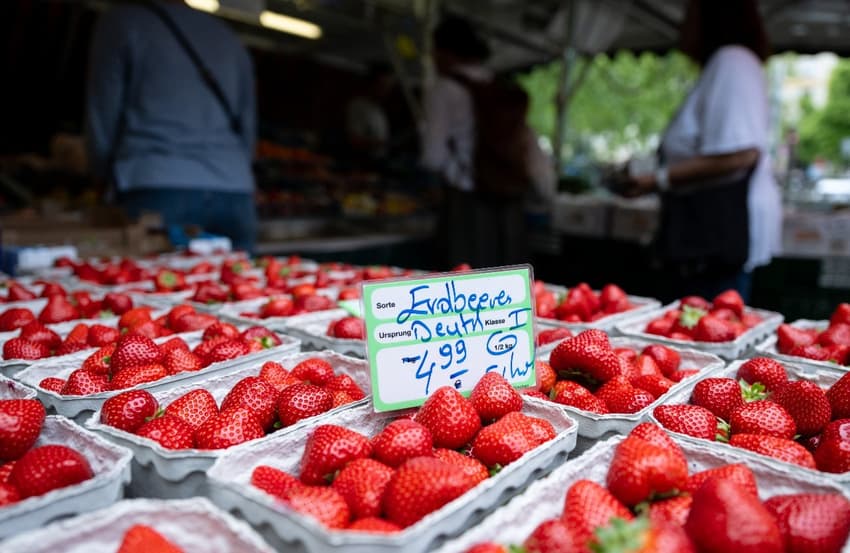Why is inflation rising again in Germany?

The latest figures from the Federal Office of Statistics show that inflation in Germany increased again in June. What's behind the steep rise in the cost of living - and will it last?
For many people in Germany, the soaring cost of living has been a major worry over the past year.
When Russia launched its full-scale invasion of Ukraine back in February 2022, energy prices skyrocketed and almost all areas of our lives became more expensive as a result. That led to average inflation of 7.9 percent in 2022 - a figure that reflects the huge squeeze in living standards that many consumers have felt.
This year, however, the price spiral seemed to have calmed down a little bit, and inflation has been dropping for the past three months. However, June's inflation rate - announced on Tuesday - has bucked the trend, with prices rising by an average of 6.4 percent year-on-year. That represents a 0.3 percent uptick against May's figure of 6.1 percent.
READ ALSO: German unemployment inches up in June as recession bites
According to experts, this is largely down to the eye-watering cost of groceries: consumers have been feeling the squeeze in the supermarkets for some time now, and the latest figures don't offer much hope of relief.
In June, average food prices were up 13.7 percent compared to the same month in 2022. The steepest rises were seen in dairy products, which went up by 22.3 percent year-on-year; confectionary, jams and honey (19.4 percent), vegetables (18.8 percent) and bread and cereal products (18.3 percent).
However, the financial relief measures introduced in June last year could also be playing a role in the higher rate of inflation.
"Food continues to be the strongest price driver," explained Federal Statistics Office president Ruth Brand. "In addition, the German government's 2022 relief measures - the €9 ticket and petrol rebate - result in a base effect that increases the current inflation rate."
In other words, since the prices of train travel and fuel were artificially dampened last year, the increase in prices year-on-year appears more significant, which drives up the rate of inflation.
This can be seen in the fact that the cost of local transport tickets was up around 65 percent compared to the same month in 2022, for example.
READ ALSO: Why does Germany have a 'perceived inflation' rate of 18 percent?
In a positive piece of news for consumers, this means that the temporary rise in inflation is likely to be a blip - and experts expect the rate to resume its downward curve in the near future.
Nevertheless, inflation rates of over 6 percent continue to eat away at household budgets, particularly for lower-income groups who tend to spend a far higher proportion of their incomes on things like rent, groceries and energy bills.
Comments
See Also
For many people in Germany, the soaring cost of living has been a major worry over the past year.
When Russia launched its full-scale invasion of Ukraine back in February 2022, energy prices skyrocketed and almost all areas of our lives became more expensive as a result. That led to average inflation of 7.9 percent in 2022 - a figure that reflects the huge squeeze in living standards that many consumers have felt.
This year, however, the price spiral seemed to have calmed down a little bit, and inflation has been dropping for the past three months. However, June's inflation rate - announced on Tuesday - has bucked the trend, with prices rising by an average of 6.4 percent year-on-year. That represents a 0.3 percent uptick against May's figure of 6.1 percent.
READ ALSO: German unemployment inches up in June as recession bites
According to experts, this is largely down to the eye-watering cost of groceries: consumers have been feeling the squeeze in the supermarkets for some time now, and the latest figures don't offer much hope of relief.
In June, average food prices were up 13.7 percent compared to the same month in 2022. The steepest rises were seen in dairy products, which went up by 22.3 percent year-on-year; confectionary, jams and honey (19.4 percent), vegetables (18.8 percent) and bread and cereal products (18.3 percent).
However, the financial relief measures introduced in June last year could also be playing a role in the higher rate of inflation.
"Food continues to be the strongest price driver," explained Federal Statistics Office president Ruth Brand. "In addition, the German government's 2022 relief measures - the €9 ticket and petrol rebate - result in a base effect that increases the current inflation rate."
In other words, since the prices of train travel and fuel were artificially dampened last year, the increase in prices year-on-year appears more significant, which drives up the rate of inflation.
This can be seen in the fact that the cost of local transport tickets was up around 65 percent compared to the same month in 2022, for example.
READ ALSO: Why does Germany have a 'perceived inflation' rate of 18 percent?
In a positive piece of news for consumers, this means that the temporary rise in inflation is likely to be a blip - and experts expect the rate to resume its downward curve in the near future.
Nevertheless, inflation rates of over 6 percent continue to eat away at household budgets, particularly for lower-income groups who tend to spend a far higher proportion of their incomes on things like rent, groceries and energy bills.
Join the conversation in our comments section below. Share your own views and experience and if you have a question or suggestion for our journalists then email us at [email protected].
Please keep comments civil, constructive and on topic – and make sure to read our terms of use before getting involved.
Please log in here to leave a comment.